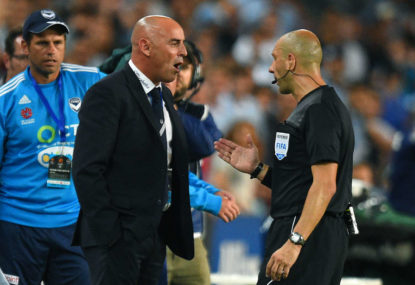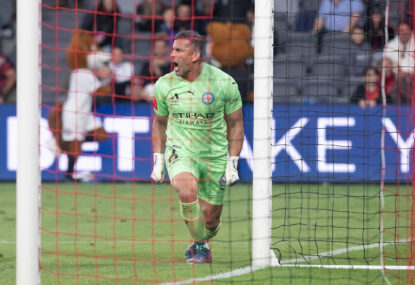May is a tumultuous month for football fans. It’s a month where the silverware is divvied out for the lucky few, while the rest pick through the scraps of their season to find out what went wrong.
Southend United manager Phil Brown, who’s side plays in England’s League Two, was recently quoted as saying: “We’re going into May, which is notorious for heartache, pain or euphoria. It’s where promotion is won or lost.”
And he’s right. For the few teams who are tantalisingly close enough to promotion to touch it, it’s what happens right here right now in the play-offs that matters.
Despite a phenomenal late season run of form for Brown’s Southend – including eight consecutive clean sheets – they fell just short of third spot after succumbing to a 3-1 away defeat at Morecombe.
This result consigned the Shrimpers to the roulette wheel of the playoffs – and potentially a fortnight of anxiety and stress.
Southend, Stevenage, Wycombe and Plymouth will contest the League Two play-offs, while Chesterfield, Preston, Sheffield United and Swindon face-off in League One.
The biggest focus – and the most money – lies in the Championship play-offs.
The Championship play-off Final is the most lucrative single game in world football. Last year’s winners QPR netted a minimum of £134 million (AUS $260 million) last season after beating Derby County 1-0.
And in a season of fantastic stories in the Championship, the playoffs will provide as satisfying a narrative, with an intriguing David and Goliath match-up between Brentford and Middlesborough, and the East Anglian Old Farm Derby between Norwich and Ipswich.
Phil Brown should have no fear of the play-offs, having won the big prize in 2008 with Hull City. But anything can happen in this lottery, just ask League One promotion hopefuls Preston North End.
Preston have competed in nine play-off campaigns in their history, winning none of them.
This season they finished in third spot in League One. Should there be any sporting justice in this world (which there is not) they will surely join the teams above them in the Championship next year.
However, such a neat and tidy solution is rarely the result of the play-off lottery and Preston are just as likely to be knocked out of the reckoning by Chesterfield, an undoubtedly inferior team who finished a colossal 20 points in arrears to them in the league table.
And it’s this that irks the traditionalists.
That a team can be successful all season – enough to finish a point or so away from being promoted automatically – and yet fall in the playoffs is particularly galling and heartbreaking for fans.
The play-offs have been a permanent fixture in the Football League since 1987, and although most detractors only hate the format due to footballing tragedy involving an otherwise successful season curtailed at the last hurdle – and they do have a point.
Surely the whole purpose of a league system is to ascertain the best club over a sustained period of time. The playoffs – as effective stand alone games – don’t reward consistently, simply the form teams.
Yet some of the great games have taken place in the play-off finals.
One of the most memorable games in the history of the famous old Wembley Stadium was the 1998 Division One play-off final between Sunderland and Charlton Athletic. An enthralling 4-4 draw was played out after extra time in front of 77,739 baying spectators, Charlton eventually winning 7-6 on penalties.
However way you look at it, the play-offs in England offer a rich finale to the regular season and engage interest for a greater number of teams throughout the season, and for those devoid of an emotional attachment to the teams involved the play-offs are a joyous mix of heartbreaking drama and phenomenal entertainment.
In Australia, the point of the play-offs is fundamentally different, although it is one borne out of necessity.
Aside from the traditional Australian fascination with finals, the A-League is a competition devoid of the drama of relegation to enthral spectators, and with qualification for the Asian Champions League remaining less of a prize than it deserves to be, having a finals series is the only sure way to retain interest for the majority of teams throughout the entire season.
By using this argument it even makes sense to have six of the league’s ten teams eligible for finals football as it keeps the interest alive late in the season and results in less dud matches.
And the A-League finals are set to provide as much excitement as its English equivalents this coming weekend. Melbourne have already drawn a massive crowd for a huge derby and Sydney will host an Adelaide team in scintillating form.
Personally, I am torn between hoping the teams who deserve promotion or the title to win out over the next two weeks, and the desire to see a shock or two.
Speaking on ABC‘s Offsiders program on the weekend, Australia coach Ange Postecoglou said that he is a traditionalist in the opposite sense to the rest of the footballing world, in that he thinks that the winner of the grand final is the champion.
But for me Victory have been the best team this year (Perth notwithstanding), resulting in them occupying top spot on the ladder at the final reckoning. As such, they should be considered champions as winners of the Premier’s Plate.
In England, there is a clear split in every league between the two teams who were within touching distance of automatic promotion and those who filling the final two positions in the playoff picture.
So am I saying it would be unfair if those teams don’t make the final in their divisions? Just as it would be unfair should Victory not win the A-League?
It’s a tough statement to agree with. We know the sporting gods are anything but fair, and I’d bank on there being plenty of shocks across the next two weeks.
And despite my traditionalist leanings, I am torn between a desire for sporting justice and the sheer exhilaration and drama the play-offs provide.
If I could add the ridiculous and impossible caveat of ‘if you could guarantee promotion via the play-offs’, then I would want to win promotion that way every season.
But surely the greatest joy from winning via the playoffs is its unpredictable nature. After all, isn’t unpredictability itself the joy of sport?
In that case, as a Southend fan, I must force myself to embrace the torture that will unfold over the next couple of weeks and relish in the drama it provides.
And hope that next year we make it into the automatic places instead.




































































































